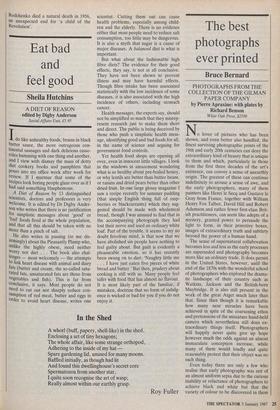Eat bad and feel good
Sheila Hutchins
A DIET OF REASON edited by Digby Anderson
Social Affairs Unit, £5.95
Ido like unhealthy foods, brains in black butter sauce, the more outrageous con- tinental sausages and dark delicious casse- roles humming with one thing and another, and I view with dismay the mass of dotty diet cookery books and pamphlets that pours into my office week after week for review. If I murmur that some of the recipes look boring people glaze over as if I had said something blasphemous. A Diet of Reason by 13 distinguished scientists, doctors and professors is very welcome. It is edited by Dr Digby Ander- son who writes that there is no justification for simplistic messages about 'good' or bad' foods fired at the whole population, and that all this should be taken with no more than a pinch of salt. He also writes in passing (to me dis- armingly) about the Pleasantly Plump who, unlike the highly obese, need neither worry nor diet . . . The book also chal- lenges — most welcomely — the attempts to link heart disease with animal and dairy fats (butter and cream, the so-called satu- rated fats, unsaturated fats are those from vegetables and fish). This is far from conclusive, it says. Most people do not need to cut out nor sharply reduce con- sumption of red meat, butter and eggs in order to avoid heart disease, writes one scientist. Cutting them out can cause health problems, especially among child- ren and the elderly. There is no evidence either that most people need to reduce salt consumption, too little may be dangerous. It is also a myth that sugar is a cause of major diseases. A balanced diet is what is important.
But what about the fashionable high fibre diets? The evidence for their good effects, they say, is not at all conclusive. They have not been shown to prevent illness and may have harmful effects. Though fibre intake has been associated statistically with the low incidence of some diseases, it is also associated with the high incidence of others, including stomach cancer.
Health messages, the experts say, should not be simplified so much that they misrep- resent research just to make them short and direct. The public is being deceived by those who push a simplistic health mess- age, identifying good and bad foods for all, in the name of science and arguing for government food controls.
Yet health food shops are opening all over, even in innocent little villages. I look in the windows in amazement wondering what is so healthy about pre-boiled honey, or why lentils are better than butter beans, or raisins and dried pears better than other dried fruit. In one large glossy magazine I saw a recipe recently for summer pudding (that simple English thing full of rasp- berries or blackcurrants) which they sug- gested should be made with wholemeal bread, though I was amused to find that in the accompanying photograph they had lost their nerve and used an ordinary white loaf. Part of the trouble, it seems to my no doubt frivolous mind, is that now that we have abolished sin people have nothing to feel guilty about. But guilt is evidently a pleasurable emotion, so it has recently been swung on to diet: 'Naughty little me . . . I have just eaten five pieces of white bread and butter.' But then, prudery about cooking is still with us. Many people feel safer with food that has almost no flavour. It is most likely part of the familiar, if mistaken, doctrine that no form of indulg- ence is wicked or bad for you if you do not enjoy it.










































 Previous page
Previous page